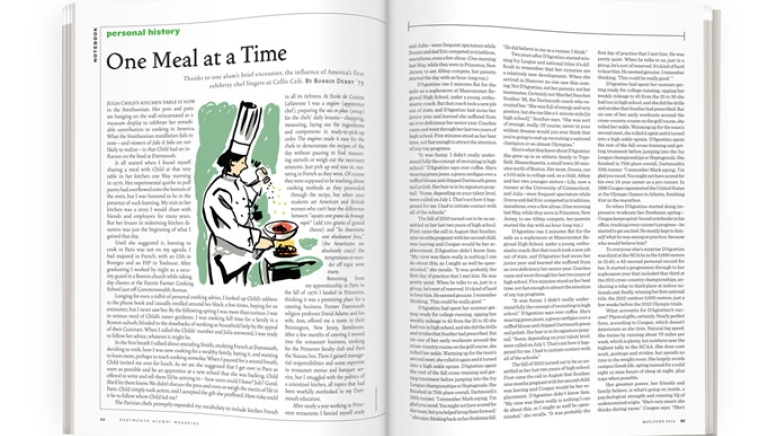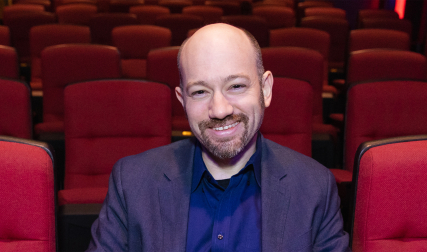Julia Child’s kitchen table is now in the Smithsonian. Her pots and pans are hanging on the wall reincarnated as a museum display to celebrate her remarkable contribution to cooking in America. What the Smithsonian installation fails to note—and viewers of Julie & Julia are not likely to realize—is that Child had an influence on the food at Dartmouth.
It all started when I found myself sharing a meal with Child at that very table in her kitchen one May morning in 1976. Her experimental quiche in puff pastry had overflowed onto the bottom of the oven, but I was honored to be in the presence of such learning. My visit to her kitchen was a story I would share with friends and employees for many years. But her lesson in redeeming kitchen disasters was just the beginning of what I gained that day.
Until she suggested it, learning to cook in Paris was not on my agenda. I had majored in French, with an LSA in Bourges and an FSP in Toulouse. After graduating I worked by night as a security guard in a Boston church while taking day classes at the Fannie Farmer Cooking School just off Commonwealth Avenue.
Longing for even a tidbit of personal cooking advice, I looked up Child’s address in the phone book and casually strolled around her block a few times, hoping for an encounter, but I never saw her. By the following spring I was more than curious. I was in serious need of Child’s career guidance. I was cooking full time for a family in a Boston suburb, blinded to the drawbacks of working as household help by the appeal of their Cuisinart. When I called the Childs’ number and Julia answered, I was ready to follow her advice, whatever it might be.
In the first breath I talked about attending Smith, studying French at Dartmouth, deciding to cook, how I was now cooking for a wealthy family, hating it, and wanting to learn more, perhaps to teach cooking someday. When I paused for a second breath, Child invited me over for lunch. As we ate she suggested that I get over to Paris as soon as possible and be an apprentice at a new school that she was backing. Child offered to write and tell them I’d be arriving in—how soon could I leave? July? Good. She’d let them know. We didn’t discuss the pros and cons or weigh the merits of life in Paris. Child simply took action, and I accepted the gift she proffered. How risky could it be to follow where Child led me?
The Parisian chefs promptly expanded my vocabulary to include kitchen French in all its richness. At Ecole de Cuisine LaVarenne I was a stagière (apprentice chef), preparing the mis en place (setup) for the chefs’ daily lessons—chopping, measuring, laying out the ingredients and components in ready-to-pick-up order. The stagières made it easy for the chefs to demonstrate the recipes of the day without pausing to find measuring utensils or weigh out the necessary amounts. Just pick up and toss in, narrating in French as they went. Of course they were supposed to be teaching about cooking methods as they proceeded through the recipe, but when your students are American and British women who can’t hear the difference between “ajoutez cent grams du fromage rapèe” (add 100 grams of grated cheese) and “les Americains sont absolument foux,” (the Americans are absolutely crazy) the temptations to wander off topic were many.
Returning from my apprenticeship in Paris in the fall of 1976 I landed in Princeton, thinking it was a promising place for a catering business. Former Dartmouth religion professor David Adams and his wife, Ann, offered me a room in their Pennington, New Jersey, farmhouse. After a few months of catering I moved into the restaurant business, cooking for the Princeton faculty club and then the Nassau Inn. There I gained managerial responsibilities and some expertise in restaurant menus and banquet service, but I struggled with the politics of a unionized kitchen, all topics that had been woefully overlooked in my Dartmouth education.
After nearly a year working in Princeton restaurants I fancied myself ready for New York City. Looking for a restaurant serving healthy food, I applied for a job at a promising venture offering gorgeous salads and fresh foods. But behind the kitchen door the practices of hiring illegal aliens and bribing health code officials to avoid scrutiny created a work environment I couldn’t stomach. As I caught on that these were standard operating procedures for New York restaurants I retreated from the city and from my hopes of becoming a success in such a world.
I headed for Hanover, a place that still felt like home. Coincidentally, Dartmouth was looking for a manager for the not-yet-opened Collis Café—someone who knew the restaurant business, could work with student employees and had some fresh ideas about food. This was a job description written for me.
There were only two months between my hiring and the scheduled opening in January 1979. I searched for vendors, ordered equipment and tested recipes, excited to have the opportunity to offer new food on campus and to shape a work environment where my staff would be co-creators. In the first few weeks bowls had arrived but not plates, so we made soup. When the plates arrived, we made omelets and sandwiches. Best of all were the trays, so our customers could purchase several items at once (though the trays had a way of disappearing with each new snowfall).
We grew alfalfa sprouts on screen trays made for us by the Hopkins Center wood shop. We found a baker in Woodstock, Vermont, to supply us with whole wheat chocolate chip cookies and fresh bagels—both previously unavailable in Hanover. Each term I’d teach a new batch of student employees how to make fluffy omelets, turn a diminishing pot of soup into a new concoction, bake bars, cakes, muffins. Within six months we were serving 2,000 customers a day.
A year later I left the restaurant business one final time. Collis went on to outgrow its original cramped kitchen and dining area over the campus security office, losing much of its early granola-head character but retaining its commitment to slow food and thoughtful preparation. I had struggled for years in catering and restaurants where customers just wanted to buy food with impersonal service. At Collis I could integrate my delight in feeding people into the kinds of foods we prepared. Soups to make you feel good. Sandwiches invented each morning. Along the way dozens of students learned to cook. I loved that part. I felt Child would have been proud.
That lunch with Child back in 1976 started a little train of events that has affected the lives of now thousands of Dartmouth students who eat and work at Collis. Although I’ve moved on, and Collis has moved on, it began with Child’s advice and her legacy—a love of fresh food and a love of sharing both cooking and eating.
Robbin Derry is an associate professor of management at the University of Lethbridge in Edmonton, Alberta.




